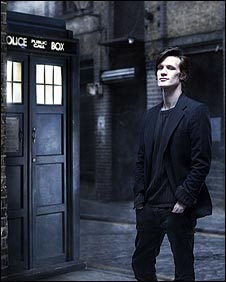Take-no-guff CIA agent Angelina Jolie is forced to become a rogue asset when she’s falsely outed as a Russian spy in the new trailer for Phillip Noyce’s Salt, also with Liev Schreiber and Chiwetel Ejiofor. Noyce has been making international-minded prestige pics of late (Rabbit-Proof Fence, Catch a Fire, The Quiet American), so this is more of a throwback to his early Jack Ryan days (Patriot Games, Clear and Present Danger.) And Jolie’s never hard to watch, and I think she could make for a fun female Bond…but let’s hope this is better than their last pic together, The Bone Collector (or, for that matter, Doug Liman’s Mr. & Mrs. Smith, which most obviously comes to mind here.)
Tag: Chiwetel Ejiofor
Who What Now?
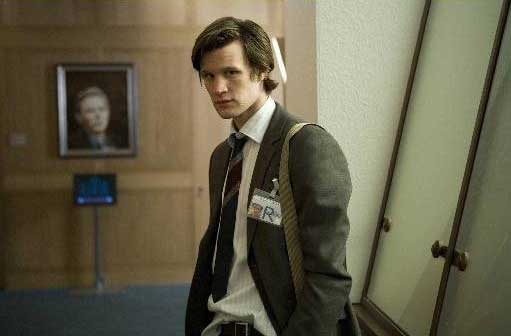
Benjamin Button isn’t the only fellow growing younger these days: Official word just came down from the BBC powers-that-be that 26-year-old Matt Smith has been cast as the next iteration of Doctor Who, for Stephen Moffatt’s first full season as showrunner, beginning in 2010. (David Tennant will still be holding down the fort for a few more specials in 2009 — he regenerates next Christmas.)
Well, I don’t know anything about this fellow, so I can’t really evaluate the pick until I’ve seen him face down a few Daleks and the like. But given the A-lister and outside-the-box names that have been floating around over the past few weeks (James McAvoy, Bill Nighy, Chiwetel Ejiofor, Catherine Zeta Jones, etc.), it’s hard not to feel slightly disappointed about this. Ah well, I’ll manage.
Midnight Agents, Superhuman Crews.
Among the bountiful harvest that is the Quantum of Solace trailer crop…
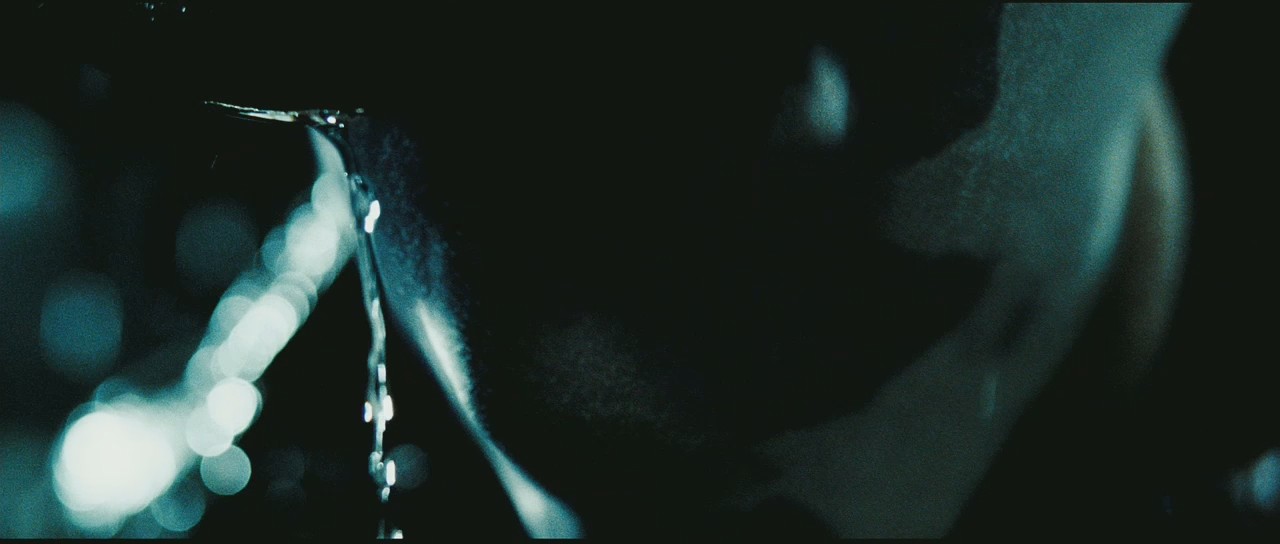
I’m all over the place on this one. There are some real red flags here — all the Snydery slo-mo shots of Malin Ackerman’s hair, for example — and some of the dialogue feels as stiff and expository as the ponderous take-a-meeting scenes in 300. Then again, as with the first trailer, I’m still having trouble just wrapping my mind around the fact that they finally made a Watchmen movie. So I’m inclined to be charitable, and the little flourishes throughout (Rorschach’s mask moves!) appeal to my inner fanboy regardless. (Also, while Jackie Earle Hale’s Bale-Batman-growl may be a tad distracting, it’s hard to imagine Rorschach with any other kind of voice.) For now, I’ll call it a push.
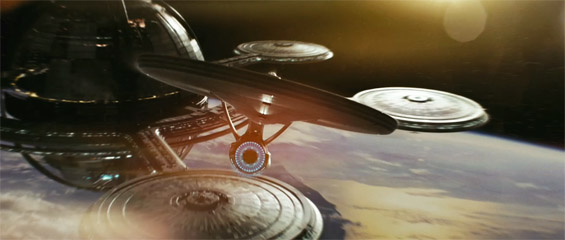
Also out of late:
The Haint of Harlem.
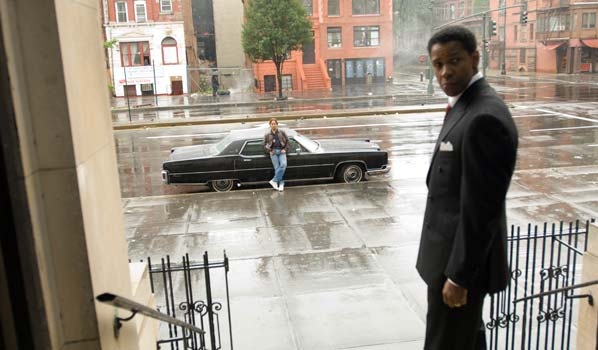
Superfly, Serpico, The French Connection…Ridley Scott’s American Gangster plays for most of its run like a greatest hits cover-medley of the cop and gangster thrillers of the 1970s. But, while well-made and eminently watchable, Gangster never becomes truly engaging. (EW’s Owen Gleiberman pretty much nailed it when he called the film “a ghost version of a 70’s classic.”) It’s hard to fault the superior production values or the large, impressive cast, which is chock-full of ringers in even the smallest of roles. But for all the quality on display, American Gangster doesn’t come close to matching the mischievous vibrancy of Denzel Washington’s last 70’s homage, Spike Lee’s Inside Man, nor is it even the best attempt at a throwback 70’s cop flick this year — that would be David Fincher’s haunting Zodiac. Gangster hits its beats well enough, which isn’t surprising given that Ridley Scott’s at the helm. But, however gritty and lived-in at times, it’s still missing the pulse that would make it a truly memorable movie. Frank Lucas may be an O.G., but Gangster, frankly, could’ve benefited from more in the way of originality.
As Gangster opens, we witness the aforementioned Frank Lucas (Washington) lighting a bound man on fire and then unloading a clip into him — from the get-go, this guy clearly has a dark side. We then watch him watching his mentor, “Bumpy” Johnson (Clarence Williams III) doling out Thanksgiving turkeys to the people of Harlem from the back of a truck, driving home, a la Willie Stark in All the King’s Men, the importance of public perception in maintaining a criminal empire. Bumpy lives just long enough in the film to impart some choice lessons in vertical integration before he succumbs to a heart attack, leaving Lucas to take over and consolidate the Harlem drug trade. This Lucas does by bypassing all the usual middlemen — the Italian mafia, crooked cops, etc. — and procuring his heroin supply direct from the source, deep in the jungles of Southeast Asia, thus enabling him to sell purer stuff on the streets at a cheaper price. (The product gets into the country by way of U.S. military planes coming back from Vietnam.)
As this new drug empire grows — and stays mostly under the radar, thanks to Lucas’ emphasis on ignoring flash — we also follow the story of one Richie Roberts (Russell Crowe). As cops go, Roberts is old-school: He prides himself on his honesty and incorruptability despite his intimate connections with some mid-level mafiosi, his flagrant sleeping around (which has turned his failed marriage to Carla Gugino into an ugly custody battle) and the fact that every other po-lice in his unit — and in NYC, for that matter — seems to be on the take. Eventually, of course, Det. Roberts sets his sights on Lucas, and the game truly begins…
But, game or no, everybody knows the dice are loaded. Part of the problem with American Gangster is that there’s no real mystery about how it’ll all turn out in the end. Even if you don’t know a thing about Lucas going in (and I didn’t), these sorts of movies invariably follow a rather predictable pattern, and all the police procedural work, Harlem vignettes, or heroin house of horror asides throughout here can’t hide the fact that Gangster follows it to the letter. Also, while Washington and Crowe are both among some of the best actors working today, neither is given much to work with here. As a hard-working, quick-witted family man who prizes loyalty and doesn’t take any guff from those around him, the Frank Lucas character is right in Denzel’s usual wheelhouse, even despite the additional sociopathic streak. (His turn in Training Day seemed more of a stretch.) And Crowe’s Roberts is well-played but, frankly, not all that interesting as written. Crowe can definitely do conflicted cops — Exhibit A, L.A. Confidential — but this is the first performance by him that I can remember that doesn’t make much of an impression.
And that doesn’t just go for the top two. American Gangster boasts a veritable Murderer’s Row of quality, likable character actors in its credits — not only Williams and Gugino but Chiwetel Ejiofor, Idris Elba, Josh Brolin, Joe Morton, Jon Polito, John Hawkes, John Ortiz, Ruby Dee, and rappers RZA and Common (as well as Cuba Gooding Jr. and Norman Reedus) — but more often than not they just get lost in the shuffle here. (That being said, Armand Assante, overplaying his genteel mafia don to the hilt, does manage to squeeze in a particularly lousy performance.) Not to be too harsh, Gangster isn’t a terrible film, nor even really a bad one. But, however well-made, it’s more by-the-numbers than it is blue magic.

Portraits of Urban Decay.
A few recent additions to the trailer bin: Will Smith finds a lot of alone time in New York City in the way-over-the-top teaser for Francis Lawrence’s I am Legend (which looks nothing like the Richard Matheson novella and only slightly more like the last version, Charlton Heston’s The Omega Man); Denzel Washington and Russell Crowe, sporting Zodiac-era duds and dos, go mano a mano (again) in the trailer for Ridley Scott’s American Gangster (also with Chiwetel Ejiofor, Carla Gugino, and Josh Brolin); and Jodie Foster gets all Bernie Goetz up in here — much to the dismay of Terrence Howard — in the new trailer for Neil Jordan’s The Brave One. Update: Ok, one more. President William Hurt is shot! (Or is he?) And secret servicemen Dennis Quaid and Matthew Fox, along with a Zapruderish Forest Whitaker, Sigourney Weaver, and others, must get to the bottom of it all in the new trailer for Pete Travis’s Vantage Point.
Frodo goes Gollum | O Beware, my Lords, of Jealousy.
Elijah Wood as Iggy Pop? Um, I’m not sure I see it. But, in more intriguing entertainment news, Chiwetel Ejiofor and Ewan MacGregor will team up for Othello on the London stage, as Othello and Iago respectively. That’d be great to see.
2006 (Finally) in Film.
Well, there are still a number of flicks I haven’t yet seen — David Lynch’s Inland Empire, for example, which I hope to hit up this weekend. But as the Oscar nods were announced today, and as the few remaining forlorn Christmas trees are finally being picked up off the sidewalk, now seems the last appropriate time to crank out my much belated end-of-2006 film list (originally put off to give me time to make up for my New Zealand sojourn.) To be honest, I might’ve written this list a few weeks earlier, had it not happened that I ended up seeing the best film of 2005 in mid-January of last year, thus rendering the 2005 list almost immediately obsolescent. But, we’ll get to that — As it stands, 2006 was a decent year in movies (in fact a better year in film than it was in life, the midterms notwithstanding), with a crop of memorable genre flicks and a few surprisingly worthy comebacks. And, for what it’s worth, I thought the best film released in 2006 was…
[2000/2001/2002/2003/2004/2005]
1. United 93: A movie I originally had no interest in seeing, Paul Greengrass’s harrowing docudrama of the fourth flight on September 11 captured the visceral shock of that dark day without once veering into exploitation or sentimentality (the latter the curse of Oliver Stone’s much inferior World Trade Center.) While 9/11 films of the future might offer more perspective on the origins and politics of those horrible hours, it’s hard to imagine a more gripping or humane film emerging anytime soon about the day’s immediate events. A tragic triumph, United 93 is an unforgettable piece of filmmaking.
[1.] The New World (2005): A movie which seemed to divide audiences strongly, Terence Malick’s The New World was, to my mind, a masterpiece. I found it transporting in ways films seldom are these days, and Jamestown a much richer canvas for Malick’s unique gifts than, say, Guadalcanal. As the director’s best reimagining yet of the fall of Eden, The New World marvelously captured the stark beauty and sublime strangeness of two worlds — be they empires, enemies, or lovers — colliding, before any middle ground can be established. For its languid images of Virginia woodlands as much as moments like Wes Studi awestruck by the rigid dominion over nature inherent in English gardens, The New World goes down as a much-overlooked cinematic marvel, and (sorry, Syriana) the best film of 2005.
2. Letters from Iwo Jima: Having thought less of Flags of our Fathers and the woeful Million Dollar Baby than most people, I was almost completely thrown by the dismal grandeur and relentless gloom of Eastwood’s work here. To some extent the Unforgiven of war movies, Iwo Jima is a bleakly rendered siege film that trafficks in few of the usual tropes of the genre. (Don’t worry — I suspect we’ll get those in spades in two months in 300.) Instead of glorious Alamo-style platitudes, we’re left only with the sight of young men — all avowed enemies of America, no less — swallowed up and crushed in the maelstrom of modern combat. From Ken Watanabe’s commanding performance as a captain going down with the ship to Eastwood’s melancholy score, Letters works to reveal one fundamental, haunting truth: Tyrants may be toppled, nations may be liberated, and Pvt. Ryans may be saved, but even “good wars” are ultimately Hell on earth for those expected to do the fighting.
3. Children of Men: In the weeks since I first saw this film, my irritation with the last fifteen minutes or so has diminished, and Alfonso Cuaron’s Children of Men has emerged for what it is — one of the most resonant “near-future” dystopias to come down the pike in a very long while, perhaps since (the still significantly better) Brazil. Crammed with excellent performances by Clive Owen, Michael Caine, Chiwetel Ejiofor and others, Children is perhaps a loosely-connected grab bag of contemporary anxieties and afflictions (terrorism, detainment camps, pharmaceutical ads, celebrity culture). But it’s assuredly an effective one, with some of the most memorable and naturalistic combat footage seen in several years to boot. I just wished they’d called that ship something else…
4. Borat: Cultural Learnings of America for Make Benefit Glorious Nation of Kazakhstan: True, the frighteningly talented Sasha Baron Cohen spends a lot of time in this movie shooting fish in a barrel, and I wish he’d spent a little more time eviscerating subtler flaws in the American character than just knuckle-dragging racists and fratboy sexists. Still, the journeys of Borat Sagdiyev through the Bible Buckle and beyond made for far and away the funniest movie of the year. Verry nice.
5. The Prestige: I originally had this in Children of Men‘s spot, as there are few films I enjoyed as much this year as Christopher Nolan’s sinister sleight-of hand. But, even after bouncing Children up for degree of difficulty, that should take nothing away from The Prestige, a seamlessly made genre film about the rivalries and perils of turn-of-the-century prestidigitation. (There seems to be a back-and-forth between fans of this film and The Illusionist, which I sorta saw on a plane in December. Without sound (which, obviously, is no way to see a movie), Illusionist seemed like an implausible love story set to a tempo of anguished Paul Giamatti reaction shots. In any case, I prefer my magic shows dark and with a twist.) Throw in extended cameos by David Bowie and Andy Serkis — both of which help to mitigate the Johansson factor — and The Prestige was the purest cinematic treat this year for the fanboy nation. Christian Bale in particular does top-notch work here, and I’m very much looking forward to he and Nolan’s run-in with Heath Ledger’s Joker in The Dark Knight.
6. The Fountain: Darren Aronofsky’s elegiac ode to mortality and devotion was perhaps the most unfairly maligned movie of the year. (In a perfect world, roughly half of the extravagant praise going to Guillermo del Toro’s Pan’s Labyrinth would have been lavished on this film.) Clearly a heartfelt and deeply personal labor of love, The Fountain — admittedly clunky in his first half hour — was a visually memorable tone poem that reminds us that all things — perhaps especially the most beautiful — are finite, so treasure them while you can.
7. The Queen: A movie I shied away from when it first came out, The Queen is a canny look at contemporary politics anchored by Helen Mirren’s sterling performance as the fastidious, reserved, and ever-so-slightly downcast monarch in question. (Michael Sheen’s Tony Blair is no slouch either.) In fact, The Queen is the type of movie I wish we saw more often: a small, tightly focused film about a very specific moment in recent history. Indeed, between this and United 93, 2006 proved to be a good year for smart and affecting depictions of the very recent past — let’s hope the trend continues through the rest of the oughts.
8. Inside Man: The needless Jodie Foster subplot notwithstanding, Spike Lee’s Inside Man was a fun, expertly-made crime procedural, as good in its own way as the much more heavily-touted Departed. It was also, without wearing it on its sleeve, the film Crash should have been — a savvy look at contemporary race relations that showed there are many more varied and interesting interactions between people of different ethnicities than simply “crashing” into each other. (But perhaps that’s how y’all roll over in car-culture LA.) At any rate, Inside Man is a rousing New York-centric cops-and-robbers pic in the manner of Dog Day Afternoon or The Taking of the Pelham One Two Three, and it’s definitely one of the more enjoyable movie experiences of the year.
9. Dave Chappelle’s Block Party: Speaking of enjoyable New York-centric movie experiences, Dave Chappelle and Michel Gondry’s block party last year felt like a breath of pure spring air after a long, cold, lonely winter — time to kick off the sweaters and parkas and get to groovin’ with your neighbors. With performances by some of the most innovative and inspired players in current hip-hop (Kanye, Mos Def, The Roots, The Fugees, Erykah Badu), and presided over by the impish, unsinkable Chappelle, Block Party was one of the best concert films in recent memory, and simply more fun than you can shake a stick at.
10. Casino Royale: Bond is back! Thanks to Daniel Craig’s portrayal of 007 as a blunt, glitched-up human being rather than a Casanova Superspy, and a script that eschewed the UV laser pens and time-release exploding cufflinks of Bonds past for more hard-boiled and gritty fodder, Casino Royale felt straight from the pen of Ian Fleming, and newer and more exciting than any 007 movie in decades.
11. The Departed: A very good movie brimming over with quality acting (notably Damon and Di Caprio) and support work — from Mark Wahlberg, Alec Baldwin, Vera Farmiga, Ray Winstone, and others — Scorsese’s The Departed also felt a bit too derivative of its splendid source material, Infernal Affairs, to merit the top ten. And then there’s the Jack problem: An egregiously over-the-top Nicholson chews so much scenery here that it’s a wonder there’s any of downtown Boston left standing. But, despite these flaws, The Departed is well worth seeing, and if it finally gets Scorsese his Best Director Oscar (despite Greengrass deserving it), it won’t be too much of an outrage.
[11.] Toto The Hero (1991): Also sidelined out of this top twenty on account of its release date, Jaco Von Dormael’s Toto the Hero — Terry Gilliam’s choice of screening for an IFC Movie Night early in October — is definitely one for the Netflix queue, particularly if you’re a fan of Gilliam’s oeuvre. It’s a bizarre coming-of-age/going-of-age tale that includes thoughts of envy, murder, incest, and despair, all the while remaining somehow whimsical and fantastical at its core. (And, trust me: As with Ary Borroso’s “Brazil“, you’ll be left humming Charles Trenet’s “Boum” to yourself long after the movie is over.)
12. Tristam Shandy: A Cock and Bull Story: I guess this is where I should be writing something brief and scintillating about Michael Winterbottom’s metanarrative version of Laurence Sterne’s famous novel, one which gives Steve Coogan — and the less well-known Rob Brydon — a superlative chance to work their unique brand of comedic mojo. But I’m growing distracted and Berk has that pleading “I-want-to-go-out, are-you-done-yet” look and Kevin’s still only on Number 12 of a list that, for all intent and purposes, is three weeks late and will be read by all of eight people anyway. (But don’t tell him that — In fact, I shouldn’t even talk about him behind his back.) So, perhaps we’ll come back to this later…it’s definitely a review worth writing (again), if I could just figure out how to start.
13. Miami Vice: Michael Mann’s moody reimagining of the TV show that made him famous isn’t necessarily his best work, but it was one of the more unique and absorbing movies of the summer, and one that lingers in the memory long after much of the year’s fluffier and more traditional films have evaporated. Dr. Johnson (and Hunter Thompson) once wrote that “He who makes a beast out of himself gets rid of the pain of being a man.” I guess that’s what Crockett and Tubbs are going for with the nightclubs and needle boats.
14. CSA: The Confederate States of America: I wish I were in the land of cotton…or have we been there all along? Kevin Wilmott’s alternate history of a victorious Confederate America is a savvy and hilarious send-up of history documentaries and a sharp-witted, sharp-elbowed piece of satire with truths to tell about the shadow of slavery in our past. With any luck, CSA will rise again on the DVD circuit.
15. The Science of Sleep: Not as good or as universally applicable as his Eternal Sunshine (the best film of 2004), Michel Gondry’s dreamlike, unabashedly romantic The Science of Sleep is still a worthy inquiry into matters of the (broken) heart. What is it about new love that is so intoxicating? And why do the significant others in our mind continue to haunt us so, even when they bear such little relation to the people they initially represented? Science doesn’t answer these crucial questions (how can it?), but it does acutely diagnose the condition. When it comes to relationships, Sleep suggests, all we have to do — sometimes all we can do, despite ourselves — is dream.
16. Rocky Balboa: Rocky! Rocky! Rocky! I’m as surprised as anyone that Sly’s sixth outing as Philadelphia’s prized pugilist made the top twenty. But, as formulaic as it is, Rocky Balboa delivered the goods like a Ivan Drago right cross. Ultimately not quite as enjoyable as Bond’s return to the service, Rocky Balboa still made for a commendable final round for the Italian Stallion. And, if nothing else, he went down fighting.
17. Pan’s Labyrinth: A fantasy-horror flick occurring simultaneously within a Spanish Civil War film, Guillermo del Toro’s Pan’s Labyrinth ultimately felt to me like less than the sum of its parts. But if the plaudits it’s receiving help to mainstream other genre movies in critics’ eyes in the future, I’m all for it. It’s an ok movie, no doubt, but if you’re looking for to see one quality supernatural-historical tale of twentieth-century Spain, rent del Toro’s The Devil’s Backbone instead.
18. Little Miss Sunshine: Another film which I think is being way overpraised, Little Miss Sunshine is still a moderately enjoyable evening at the movies. It felt overscripted and television-ish to me, and I wish it was as way over yonder in the minor key as it pretends to be, but Sunshine is nevertheless a cute little IFC-style family film, and one that does have a pretty funny payoff at the end.
19. The Last King of Scotland: I just wrote on this one yesterday, so my impressions haven’t changed much. Still, Forrest Whitaker’s jovial and fearsome Idi Amin, and an almost-equally-good performance by James McAvoy as the dissolute young Scot who unwittingly becomes his minion, makes The Last King of Scotland worth seeing, if you can bear its grisly third act.
20. Thank You for Smoking: It showed flashes of promise, and it was all there on paper, in the form of Chris Buckley’s book. But Smoking, alas, never really lives up to its potential. What Smoking needed was the misanthropic jolt and sense of purpose of 2005’s Lord of War, a much more successful muckraking satire, to my mind. But Smoking, like its protagonist, just wants to be liked, and never truly commits to its agenda. Still, pleasant enough, if you don’t consider the opportunity cost.
Most Disappointing: All the King’s Men, X3: The Last Stand — Both, unfortunately, terrible.
Worth a Rental: A Scanner Darkly, Brick, Cache, Cars, Curse of the Golden Flower, Glory Road, The History Boys, Marie Antoinette, Match Point (2005), V for Vendetta, Why We Fight
Don’t Bother: Bobby, Crash (2005), The Da Vinci Code, Flags of our Fathers, The Good German, The Good Shepherd, Mission: Impossible: III, Night Watch (2004), Pirates of the Caribbean 2: Dead Men’s Chest, Poseidon, Scoop, Superman Returns, The Wicker Man, World Trade Center
Best Actor: Clive Owen, Children of Men; Forrest Whitaker, The Last King of Scotland; Ken Watanabe, Letters from Iwo Jima
Best Actress: Helen Mirren, The Queen; Q’Orianka Kilcher, The New World
Best Supporting Actor: Mark Wahlberg, The Departed; Michael Caine, Children of Men/The Prestige
Best Supporting Actress: Pam Farris, Children of Men; Vera Farmiga, The Departed; Maribel Verdu, Pan’s Labyrinth
Unseen: Apocalypto, Babel, Blood Diamond, Catch a Fire, Clerks II, The Descent, The Devil Wears Prada, Dreamgirls, Fast Food Nation, Hollywoodland, An Inconvenient Truth, Infamous, Inland Empire, Jackass Number Two, Jet Li’s Fearless, Lassie, Little Children, Notes from a Scandal, The Notorious Betty Page, A Prairie Home Companion, The Pursuit of Happyness, Running With Scissors, Sherrybaby, Shortbus, Stranger than Fiction, Tideland, Venus, Volver, Wordplay
2007: The list isn’t looking all that great, to be honest. But, perhaps we’ll find some gems in here…: 300, 3:10 To Yuma, Beowulf, Black Snake Moan, The Bourne Ultimatum, FF2, The Golden Age: Elizabeth II, The Golden Compass, Grindhouse, Harry Potter and the Order of the Phoenix, Hot Fuzz, I Am Legend, Live Free or Die Hard, Ocean’s Thirteen, PotC3, The Simpsons Movie, Smokin’ Aces, Spiderman 3, Stardust, The Transformers, Zodiac.
Born out of your Frustration.
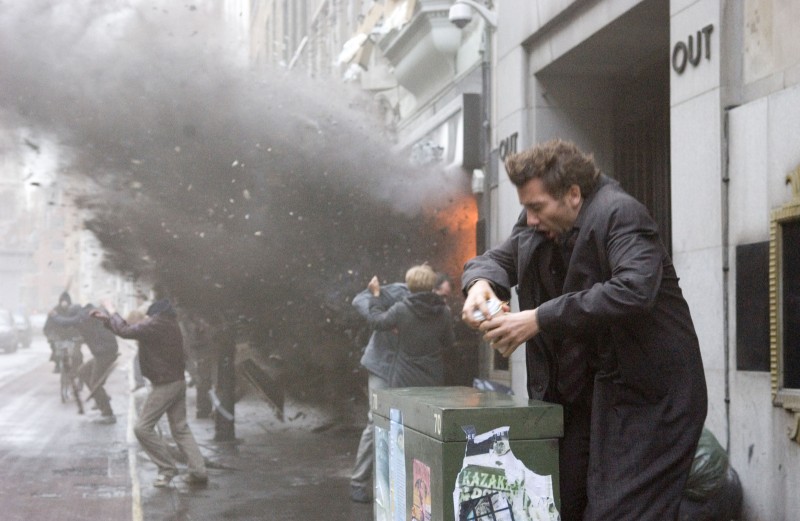
Children of Men, Alfonso Cuaron’s gritty dystopian parable of the near-future (which I saw in Nelson, NZ several days ago), is very, very close to being a great film. Boasting a standout performance by Clive Owen (other than Inside Man he hasn’t been in much lately, so I’d forgotten how good he can be), great character work by Michael Caine, Chiwetel Ejiofor, and others; timely ruminations on issues ranging from the War on Terror to immigration reform; a wicked streak of black humor (note, for example, the bus and pharmaceutical ads, as well as the “Baby Diego” stuff and the casual nod to the similarly sardonic Pink Floyd); cinematography by Emmanuel Lubezki (late of last year’s best film, The New World) that’s both striking and muted; and some of the most visceral urban-warfare scenes this side of Saving Private Ryan, the film has a lot in its corner, and is definitely worth checking out this holiday season. (Between this, The Fountain, and hopefully Pan’s Labyrinth, it’s been a banner time for heady, intelligent sci-fi/fantasy.) Alas, the film takes a few egregious missteps in the last act — the last fifteen minutes, even — which marred the experience for me. As a result, instead of leaving the theater stunned or moved by the otherwise impressive Children of Men, I left irritated with it. It’s a very good, even a remarkable, movie, to be sure, but when it comes to the last few leaps of logic (and sentiment), Cuaron’s film can’t quite stick the landing.
Children of Men takes place in the London of the not-too-distant future, where, as part of a string of world calamities and catastrophes (including some that possibly, Cuaron coyly suggests, have their roots in the Iraq war), humankind has become infertile, western civilization is in the throes of decay, and England, true to stiff-upper-lip form, remains the one teetering bastion of order against the forces of anarchy and global chaos. In this childless city under siege, where immigrants (or “Fugi’s”) are rounded up in cages and coffee shops are bombed for no reason in particular, we meet a troubled Everyman named Theo (Owen — we know he’s troubled because he downs lugs of scotch from a hip-flask whenever possible, but don’t worry — this sort of clumsy screenwriting shorthand is generally the exception here rather than the rule.) At any rate, on his way to work one day, Theo is apprehended by several masked goons in a van, among them his activist ex-girlfriend Julian (Julianne Moore) and her #2 (Ejiofor), who, as it turns out, have a very important task for him — one that only he can fulfill, and one that might just change the shape of this post-apocalyptic world…
If you’ve seen the trailer, then you know what Theo’s charge is for the remainder of the movie. (But if you haven’t, I won’t spoil it here.) Suffice to say, his travels take him to various dilapidated locales in this babyless Purgatory (including, memorably, the hideaway of Theo’s aging drug buddy Jasper (Michael Caine)), and we get a full sense of how the demise of the future, in the form of the next generation, has caused the world to wither and rot. This culminates in some of the most powerful and immersive urban war footage to come down the pike in a good while (note the long, uninterrupted shots in the final act, which are particularly impressive.) But, as you’ll come to find, one of the escape scenarios near the end — you’ll know which one I mean — is completely and utterly implausible, to the detriment of everything that’s come before. And, coupled with the ridiculously over-the-top symbolism in the final moments, Cuaron’s film unfortunately ends on a sour note. Still, if you can forgive the movie its wince of an ending, it’s well worth it to suffer the Children. It may step away from greatness in the last act, but it’s still very easily in the top echelon of movies I’ve seen this year.
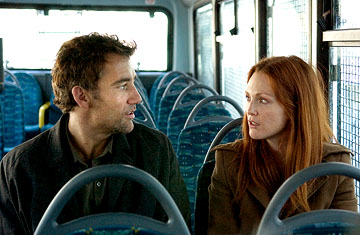
Childhood’s End | Hard Shell.
No teens or mutant teens, take your pick: In the near future, Clive Owen, Julianne Moore, Michael Caine, and Chiwetel Ejiofor look to save the Earth’s last pre-born in the dystopic new trailer for Alfonso Cuaron’s Children of Men. (Between this and The Fountain, it may be a good fall for sci-fi.) And Michelangelo, Raphael, Donatello, and Leonardo (the turtles, not the artists) get the CGI treatment in the teaser for TMNT. (No Elias Koteas or Sam Rockwell this time around? Bleah.)
Turn You Inside Out.
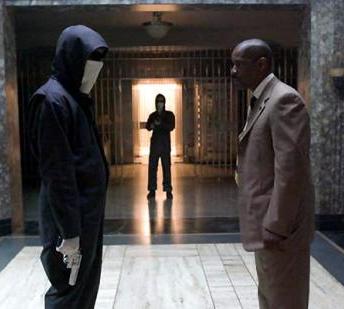 Hearkening to the halcyon days of Dog Day Afternoon and Serpico, Spike Lee’s Inside Man is a clever contraption indeed — a sleek, intelligent, well-acted NYC heist flick whose central scheme is more about subterfuge, cunning, and misdirection than technical gimmickry. (In too many films in the genre — The Score, or Ocean’s 11, for example — the robbers seem to be spending more on state-of-the-art equipment than they’d actually make in the grift.) To be sure, there are some implausibilities throughout, including pretty much all of Jodie Foster’s character and [Spoilers] the idea that Christopher Plummer would keep that Nazi paperwork lying around for sixty years, and the film’s last half-hour takes too long to put the story to bed. That being said, for the most part Inside Man is a slick caper film that offers both legitimately surprising twists and the satisfaction of seeing parts of a well-crafted scheme fall into place like tumblers in a lock. In the immortal words of Hannibal Smith, “I love it when a plan comes together.”
Hearkening to the halcyon days of Dog Day Afternoon and Serpico, Spike Lee’s Inside Man is a clever contraption indeed — a sleek, intelligent, well-acted NYC heist flick whose central scheme is more about subterfuge, cunning, and misdirection than technical gimmickry. (In too many films in the genre — The Score, or Ocean’s 11, for example — the robbers seem to be spending more on state-of-the-art equipment than they’d actually make in the grift.) To be sure, there are some implausibilities throughout, including pretty much all of Jodie Foster’s character and [Spoilers] the idea that Christopher Plummer would keep that Nazi paperwork lying around for sixty years, and the film’s last half-hour takes too long to put the story to bed. That being said, for the most part Inside Man is a slick caper film that offers both legitimately surprising twists and the satisfaction of seeing parts of a well-crafted scheme fall into place like tumblers in a lock. In the immortal words of Hannibal Smith, “I love it when a plan comes together.”
Is that a spoiler? Well, no, not really. The movie (and the trailer) begin with Dalton Russell (Clive Owen, charismatic as ever) telling us he has conceived and executed “the perfect bank robbery.” Very soon thereafter, we watch Russell and three accomplices, dressed as painters, walk into a ritzy downtown Manhattan bank, bar the doors, and take hostage of the 20-30 unfortunate New Yorkers therein. Soon, led by detectives Keith Frazier (Denzel Washington, in top form) and Bill Mitchell (the always-excellent Chiwetel Ejiofor) as well as a by-the books captain (Willem DaFoe), the NYPD surround the bank, and a protracted stand-off begins. Meanwhile, the bank’s president (Christopher Plummer) adds an X-factor to the equation by hiring a Fixer of sorts (Jodie Foster, as good as anyone could be in this goofy role) to resolve the situation to his own satisfaction. With the board thus set, the rest of the film involves the pieces moving — We watch the heist unfold over the course of a New York City day and night, punctuated by clips of Washington and Ejiofor interrogating the bank hostages after the fact.
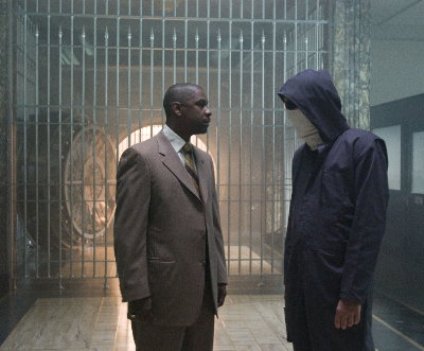 Of course, this isn’t just a well-crafted crime film, but a Spike Lee joint, and it resonates in the details. (In its own way, I’d say this is as strong as Lee’s last movie, The 25th Hour.) As Salon‘s Stephanie Zacharek notes in her positive review, “Inside Man is a movie that practices what Crash preaches.” It may be considered bizarre and even Oscar-noteworthy for people of different races and backgrounds to interact in the hermetically-sealed car-culture of Los Angeles, but New Yorkers have been colliding up against each other for some time now. And — unlike in Crash — Lee gets the feel right. (This is his thematic territory, after all.) Particularly noteworthy in this regard are the scenes involving a Sikh bank teller (Waris Ahluwalia) whom the robbers send out with their demands. On sight of turban, the cops immediately treat him like a terrorist bomber, and Ahluwalia manages to sound both terrified and fed up at the same time with the post-9/11 indignity of it all. True, some of the plot mechanics in Inside Man could be considered contrived, but, Jodie Foster’s corporate ninja notwithstanding, at least here the people seem real. (2nd Crash link via Listen Missy.)
Of course, this isn’t just a well-crafted crime film, but a Spike Lee joint, and it resonates in the details. (In its own way, I’d say this is as strong as Lee’s last movie, The 25th Hour.) As Salon‘s Stephanie Zacharek notes in her positive review, “Inside Man is a movie that practices what Crash preaches.” It may be considered bizarre and even Oscar-noteworthy for people of different races and backgrounds to interact in the hermetically-sealed car-culture of Los Angeles, but New Yorkers have been colliding up against each other for some time now. And — unlike in Crash — Lee gets the feel right. (This is his thematic territory, after all.) Particularly noteworthy in this regard are the scenes involving a Sikh bank teller (Waris Ahluwalia) whom the robbers send out with their demands. On sight of turban, the cops immediately treat him like a terrorist bomber, and Ahluwalia manages to sound both terrified and fed up at the same time with the post-9/11 indignity of it all. True, some of the plot mechanics in Inside Man could be considered contrived, but, Jodie Foster’s corporate ninja notwithstanding, at least here the people seem real. (2nd Crash link via Listen Missy.)

